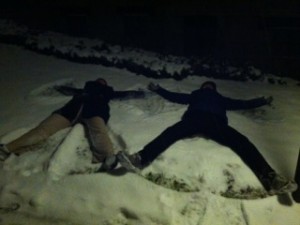by Danya Rumore
It’s a little more than a week after the completion of INC5, and I find myself reflecting on the insights I gained from the UN mercury negotiations in Geneva as I travel back to Cambridge via train. That brings me to my first important insight:
- In stark contrast to public transportation in the US, Swiss trains and buses are—true to the stereotype—perfectly on time. If the train is scheduled to depart at 9:13am, you better be on the train by 9:12:45am. As fellow team member Leah Stokes unhappily learned, if the bus is more than a minute or two late, it probably won’t come for a while: there is almost certainly a crisis on the bus line.
As I look back, I am amazed by how intense the week of INC5 was. Hence, insight number two:
- Being a delegate at international environmental negotiations is not for the faint of heart. Not only is it critical that delegates be on their game, constantly aware of what is going on in the negotiations and ensuring that they are advocating for their nation’s or organization’s interests, but they also end up basically living in the convention center for the week. After the first day, the negotiations generally continued late into the night or early into the following morning, making for 14+ hour days. Add to this the jet lag most delegates put up with as they travel from place to place, and you’ve got a pretty daunting, albeit potentially rewarding, job description.
In sum, our experience at INC5 convinced me that being a delegate might not be for me. However, watching the INC5 play out, talking to scientists on the scene such as David Evers and Celia Chen, and constantly reflecting on the negotiations with my MIT team members made me ever-more committed to working at the intersection between science and policy. Another take-away from INC5:
- Effectively integrating scientific knowledge into policy making, particularly at the international level, remains a significant challenge. We need people who can effectively “advocate” for the appropriate use of science in informing political decisions.
While at INC5, I also discovered that, even if the negotiations seem to progress at a glacial pace, you really must remain attentive and pay careful attention to things as they play out. First off, if you don’t, you might miss some excellent analogies and metaphors (such as the nations’ “tangoing” metaphor during a technical working group session). More importantly, it only takes one delegate saying one sentence (such as “we’d like to strike ‘mercury compounds’ from that sentence”—see Mark’s and my blog for more about this) to entirely change the dynamic of the debate. Since careful attention to the proceedings is really quite important if you are to make sense of the seemingly slow but yet dynamic negotiations, here’s another insight:
- If you hope to have even the faintest idea of what is really going on in the negotiations, don’t offer to manage the team’s blog and/or communications strategy. While I was entirely honored to be a blog manager for our team and honestly wouldn’t have had it otherwise, I finally had to accept that I would be lost for at least most of the discussions. Thank you to my team for keeping me abreast of what was really happening!

Sweet energy for delegates
Another theme that stands out as I reflect on the week of INC5 is the amazing hospitality of the Swiss. From the much-anticipated Swiss Breaks (which far exceeded our expectations with fire-melted raclette, ceviche, wine, and even Heidi and Peter) to the omnipresent and much appreciated “Sweet energy for delegates” (i.e., little chocolates freely available throughout the week) to the surprise late night pizza and sandwich deliveries that sustained delegates as they negotiated into the wee hours: the Swiss definitely hosted a good INC5 party.

Raclette at a Swiss Break
In addition to being entirely enjoyable, this hospitality appeared to serve the very critical function of bringing people together outside of the formal negotiations, building personal relationships to facilitate cooperation and collaboration, and keeping people feeling energized and appreciated so that they were willing to push through the late nights and challenging hours of the negotiations. Another take-away:
- Many important compromises and agreements are made outside of formal deliberations. Additionally, getting people to converse in informal settings can lead to the generation of new alternatives and possible solutions. Therefore, host nations should seriously consider throwing a good negotiations party.
A final and perhaps most important insight from our INC5 experience has less to do with what we took away from the negotiations and more to do with what we brought. Our team of ten graduate students and Professor Noelle Selin was utterly fantastic, as was our support crew back in Cambridge. Through this experience, I have developed a new cohort of brilliant, passionate colleagues and inspirational friends. I will forever appreciate the many things I learned from my conversations with fellow team members (did you know that polar bears’ fur is transparent?). I also fully intend to follow up on the crazy but amazing ideas we collaboratively generated (Science Train, anyone?). And I can hardly believe how much fun we had—highlights include: making snow angels with fellow team members sometime after midnight while in our professional attire; laughing out loud with every reply to our “INC5 Playlist” email chain; and ongoing Heidi-related hilarity. In sum, a final point of reflection:
and inspirational friends. I will forever appreciate the many things I learned from my conversations with fellow team members (did you know that polar bears’ fur is transparent?). I also fully intend to follow up on the crazy but amazing ideas we collaboratively generated (Science Train, anyone?). And I can hardly believe how much fun we had—highlights include: making snow angels with fellow team members sometime after midnight while in our professional attire; laughing out loud with every reply to our “INC5 Playlist” email chain; and ongoing Heidi-related hilarity. In sum, a final point of reflection:
- In negotiations—and in general—your team matters. Be thankful when you’ve got a good one.
Thanks to the National Science Foundation for funding this amazing learning and professional development experience, to Professor Noelle Selin for making it happen, to our amazing MIT Mercury team for all of the shared learning and fun times, to everyone who has offered their support and encouragement and/or has read our blog throughout the last couple of weeks.
